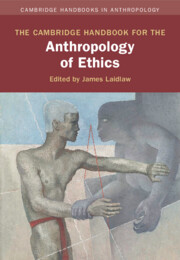Book contents
- The Cambridge Handbook for the Anthropology of Ethics
- Cambridge Handbooks in Anthropology
- The Cambridge Handbook for the Anthropology of Ethics
- Copyright page
- Contents
- Contributors
- 1 Introduction
- Part I Intellectual Sources and Disciplinary Engagements
- Part II Aspects of Ethical Agency
- Part III Media and Modes of Ethical Practice
- Part IV Intimate and Everyday Life
- Part V Institutional Life
- 29 Modern Capitalism and Ethical Plurality
- 30 The Ethics of Commerce and Trade
- 31 Activism and Political Organization
- 32 Philanthropy
- 33 Science
- 34 Communist Morality under Socialism
- Index
- References
31 - Activism and Political Organization
from Part V - Institutional Life
Published online by Cambridge University Press: 11 May 2023
- The Cambridge Handbook for the Anthropology of Ethics
- Cambridge Handbooks in Anthropology
- The Cambridge Handbook for the Anthropology of Ethics
- Copyright page
- Contents
- Contributors
- 1 Introduction
- Part I Intellectual Sources and Disciplinary Engagements
- Part II Aspects of Ethical Agency
- Part III Media and Modes of Ethical Practice
- Part IV Intimate and Everyday Life
- Part V Institutional Life
- 29 Modern Capitalism and Ethical Plurality
- 30 The Ethics of Commerce and Trade
- 31 Activism and Political Organization
- 32 Philanthropy
- 33 Science
- 34 Communist Morality under Socialism
- Index
- References
Summary
This chapter explores activism as an ethical practice and in doing so discusses the relationships between social life, political action, and ethical values. Anthropologists have approached the ethics of activism through ethnographies of activist movements’ moral critiques of the present, their utopian imaginaries for the future, and the creation of new political subjects and ways of being. This chapter draws on those anthropological discussions of social movements, putting work on union activism in Argentina in dialogue with ethnographies of feminist, queer, and alter-globalization activism, as well as voluntary social action. Drawing on the experience of unionism among public sector employees in Argentina, I show how activism builds from the understanding of an essential being or character that can be cultivated as a collective ethical subject to enable action in the world to change the world (praxis). This takes considerable work on the self and selves, not all of which is fully open to reflection. I argue that by interpreting practices of organization as ethical practices, we recognize the relational aspect of politics and the importance of affective processes of collective self-cultivation alongside rational and material imperatives to engage in political struggle.
- Type
- Chapter
- Information
- The Cambridge Handbook for the Anthropology of Ethics , pp. 791 - 816Publisher: Cambridge University PressPrint publication year: 2023

